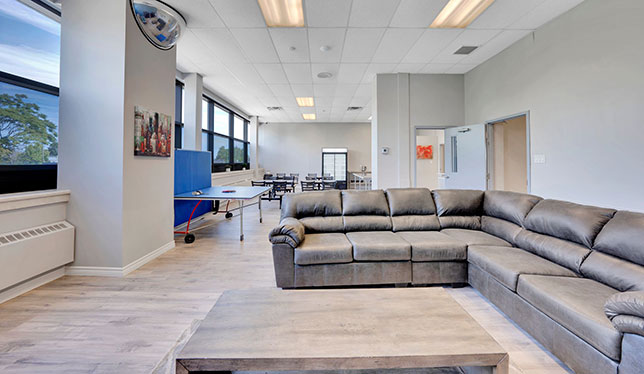A collaboration between a non-profit agency serving youth in Windsor, Ont., and the University of Windsor is behind the recent opening of a rare sober-living residence for local college and university students.
The 13-bed residence opened at the social service agency, New Beginnings, on Sept. 1. Rooms are available to any postsecondary student who has “a commitment to sober living,” although the agency has a particular interest in students aged 18 to 26.
New Beginnings executive director Stacey Yannacopoulos conceived of the idea after realizing a previous residential program in her agency’s building would be vacating a second-floor space.
“We started talking to all kinds of community partners to assess what the needs are, what the gaps are, what could we try to put in place,” said Ms. Yannacopoulos. Some of those conversations were with leaders from U of Windsor’s Lancers Recover program, created in mid-2020 to support students recovering from addiction.

New Beginnings and the U of Windsor agreed to an informal partnership, where the university refers students to the agency, so that the university could focus on getting its student recovery program better established. Collaboration with local colleges is also being pursued.
“I would like to see [a sober student residence] on campus, but this works too, for where we are in our process,” said Onawa LaBelle, an assistant professor of psychology at U of Windsor who founded Lancers Recover, studies recovery, and who has been in recovery for 17 years.
The collaboration between New Beginnings and the university is already going beyond referrals. “We will definitely be doing some social events and community-focused events as well,” said Meagan Park (who goes by the pronouns they, them and the honorific Mx.), Lancers Recover’s program coordinator. Shared recovery meetings are expected too.
Many services are included with room rental
New Beginnings has funded the project from its budget, but also charges students $8,900 to $10,900 for a single room for eight months, including utilities, laundry and internet. There is also a live-in residence adviser and residents will have access to a gym and study room.
The agency said it has carefully screened applications to ensure residents are supportive of each other (residents do not have to be in recovery but are expected to maintain a sober lifestyle) and that they are choosing the residence because they want the other supports New Beginnings offers. Those include counselling, a welcome program for international students, cooking classes and programs for anger management, healthy relationships and life skills.
Dr. LaBelle called that level of wraparound service, along with the residence’s accessibility to any postsecondary student “brilliant” and “unique” among sober student residences she’s seen in the U.S., where they are more common.
The hope is that U of Windsor students living at New Beginnings, 2.5 kilometres away from the university, will still feel like they are part of the campus. While students in recovery want to be part of campus life, “so much of that revolves around the drinking and the substances,” said Mx. Park.
“It’s personally exciting to see the sober residence because that’s exactly what I needed 10 years ago,” they said. “I ended up having to drop out because I couldn’t stay sober on campus.” They returned three years ago and recently completed their undergraduate degree, capped off with a thesis about student experiences in Canadian campus recovery programs.
The University of Guelph has offered a substance-free student residence community for about 15 years, although its location fluctuates and students are referred for additional supports elsewhere on campus when they request them.
“What Windsor is doing looks awesome and amazing,” said Patrick Kelly, U of Guelph’s interim director of student housing services. “We’re looking to see if there’s a need for that on our campus and exploring the possibilities.”
Student recovery communities have a 40-plus-year history in the U.S. but only came to Canada in 2019, starting at University of British Columbia. Other such communities have since sprung up at the University of Calgary, the University of Alberta, Concordia University and the University of Saskatchewan. Victoria Burns, an associate professor in the faculty of social work at U of Calgary, is also leading a project supported by a provincial health grant to develop recovery communities at the province’s 26 public postsecondary institutions.
With that momentum, Mx. Park believes it’s only a matter of time before Canadian universities with established recovery communities make the next move towards creating sober campus residences, including at U of Windsor. “We’re hoping to … be that model for other communities to emulate,” added Ms. Yannacopoulos. “That would be fantastic.”